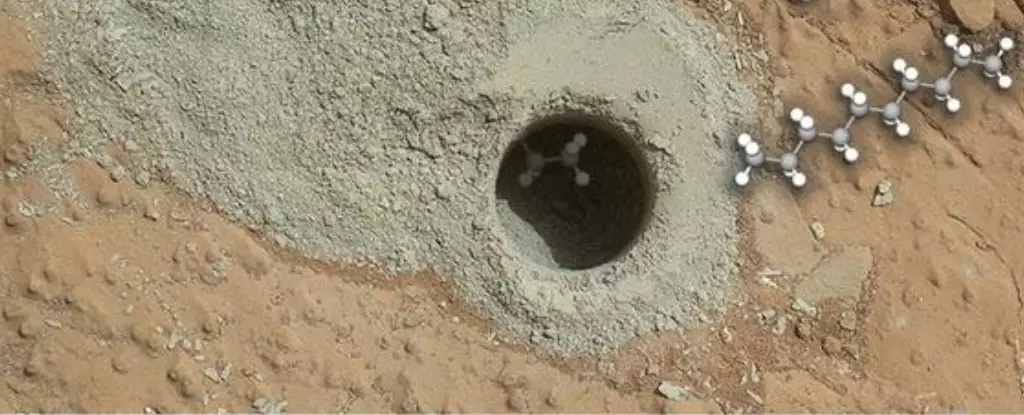The recent revelation from NASA’s Curiosity rover regarding the presence of carbon chains in a Martian lakebed is both exhilarating and daunting. The scientific community has long entertained the tantalizing possibility that our cosmic neighbor may once have hosted life. Yet, the discovery, led by the esteemed analytical chemist Caroline Freissinet and her international team, evokes skepticism. More than just the thrill of new findings, this development brings forth a battle between scientific interpretation and the inherent human desire to search for our place in the universe.
What does it mean that carbon chains—specifically, those consisting of up to a dozen atoms—were identified? While on one hand, these could be remnants of life, they might also originate from non-biological processes. Such ambiguity is characteristic of astrobiological research but fuels anxiety among both scientists and enthusiasts yearning for definitive evidence of extraterrestrial life. This juxtaposition of facts leads us to question how close we truly are to unraveling Mars’s ancient mysteries.
Curiosity’s Quest and the Hunt for Biosignatures
Curiosity’s mandate is crystal clear: to scour the Martian terrain in search of clues that could affirm or deny the existence of past life. But, do we risk over-interpretation when we celebrate each discovery? The rover’s exploration of Gale Crater has turned up a treasure chest of deposits, ranging from chlorinated organics to complex nitrates. Scientists share a collective hope that these organic compounds may lead to something transformative—the elusive biosignatures.
Critically speaking, though, is the excitement justified? Researchers persistently claim that carbon chains could result from abiotic procedures as much as biotic. The potential to overstate findings casts a shadow on the scientific integrity of such pursuits. While the data indicates the presence of carbon molecules and possible links to life, we must treat results with due discernment. It might simply be a case of nature’s chemistry forging fascinating molecules without the guidance of life.
The Methodology Behind the Findings
Delving into the science behind these findings presents its own narrative. Utilizing a chemical enhancer, the team crafted a meticulous experimental procedure to analyze mineral samples. By applying gas chromatography-mass spectrometry at temperatures around 850 °C, they exposed the samples to conditions that mimic Martian environments rather than relying solely on our terrestrial understandings. Such adaptation speaks to the ingenuity of scientists navigating uncharted territories.
Yet, there remains an unsettling feeling that even the most robust methodologies could misinterpret nature’s complexities. The identification of hydrocarbons such as decane and undecane is a commendable feat, but the question lingers: could they give rise to misleading frameworks for understanding life beyond Earth? The darker specter of false hope lurks in the shadows, serving as a reminder that our desire for answers may sometimes cloud scientific objectivity.
The Rocket Fuel of Human Imagination
Nevertheless, the implications of the findings are intoxicating. They spark imaginations and rekindle dreams of human connection with otherworldly beings, which might lead to an even deeper inquiry into our own origins. The allure of carbon chains as signs of biological processes invokes the image of Martian life forms evolving millions of years ago, drawing parallels with our own evolution on Earth. It’s an intoxicating thought that captivates the hearts and minds of many.
As a center-wing liberal, I believe in the importance of incentivizing further exploration of Mars. The essence of scientific inquiry should be steeped in curiosity, not cynicism. While we must remain grounded in skepticism, there’s a vital need to foster excitement for what might be discovered next. It’s the drive towards inquiry that leads to true progress—be it in understanding our world or the universe beyond.
Amidst speculation, longing for answers, and the chaotic turbulence of scientific debate, we must remain vigilant. The road ahead will undoubtedly require further missions and more sophisticated instrumentation to truly discern the nature of organic compounds found on Mars. Yet, with each discovery, we cling to a flickering hope that perhaps one day, we might trace back through the carbon chains to find a story more profound than we ever fathomed, connecting us to the cosmos in ways we never anticipated.



Leave a Reply